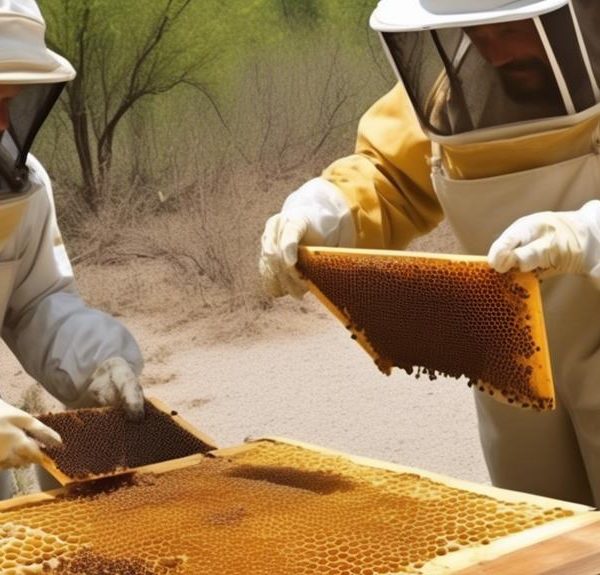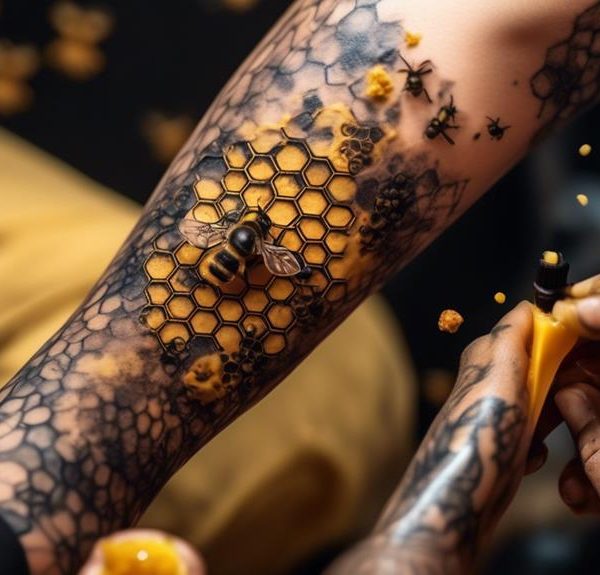Ooze into the world of bee venom in skincare and discover its surprising benefits for human skin.
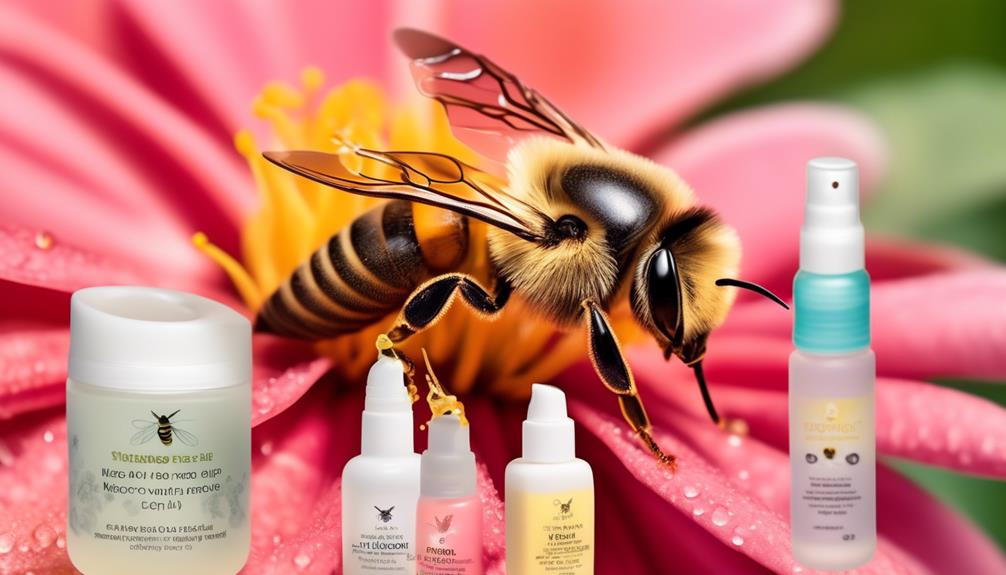
What Is Bee Venom in Skincare?
Imagine you're walking through a garden, and a bee stings you. You'd probably react with annoyance, maybe a little fear, and you'd likely seek to soothe the sting as quickly as possible.
But what if I told you that the very substance causing your discomfort could be a secret weapon in your skincare routine? Welcome to the world of bee venom in skincare, a phenomenon that's creating quite the buzz.
Bee venom, known as apitoxin, is a colorless liquid that's injected by bees as a defense mechanism. It's now being harnessed for its potential benefits to human skin.
Intrigued? Let's unravel the mystery together.
Key Takeaways
- Bee venom is a natural ingredient in skincare products that offers an alternative to synthetic chemicals.
- It stimulates collagen and elastin production, reducing the appearance of fine lines and wrinkles.
- Bee venom has anti-inflammatory properties, making it effective for managing acne and other inflammatory skin conditions.
- Patch tests are recommended before using bee venom products, especially for individuals with known bee sting allergies.
Understanding Bee Venom
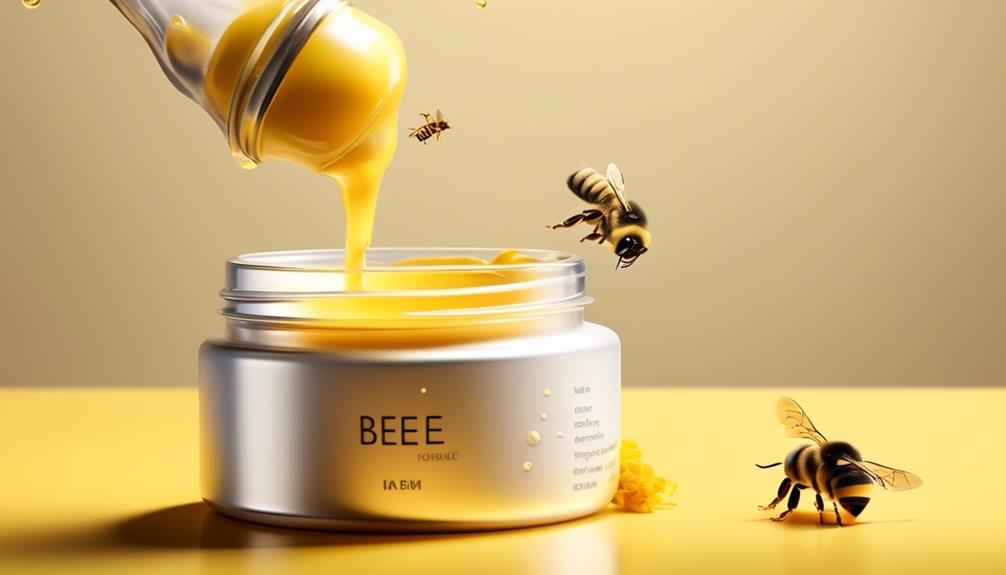
To fully appreciate the role of bee venom in skincare, you must first understand its unique composition and potent effects on human skin. Bee venom, or apitoxin, is a complex mixture of proteins, peptides, enzymes, and bioactive amines. The most prominent component, Melittin, constitutes about 50% of the venom's dry weight and is primarily responsible for the venom's pain-inducing effects.
Melittin's unique ability to break down cell membranes makes it incredibly beneficial in skincare. It tricks the skin into thinking it's been stung, which triggers an increase in blood circulation and the production of collagen and elastin. These proteins are essential for maintaining skin's elasticity and firmness, thereby minimizing the appearance of wrinkles and fine lines.
Additionally, bee venom boasts a potent blend of anti-inflammatory and antibacterial properties. This makes it an effective treatment for acne and other inflammatory skin conditions. However, it's crucial to note that not everyone's skin will positively react to bee venom. Those with bee allergies, for instance, may experience adverse reactions. Therefore, it's always recommended to conduct a patch test before fully incorporating bee venom-infused products into your skincare routine.
Extraction Process of Bee Venom
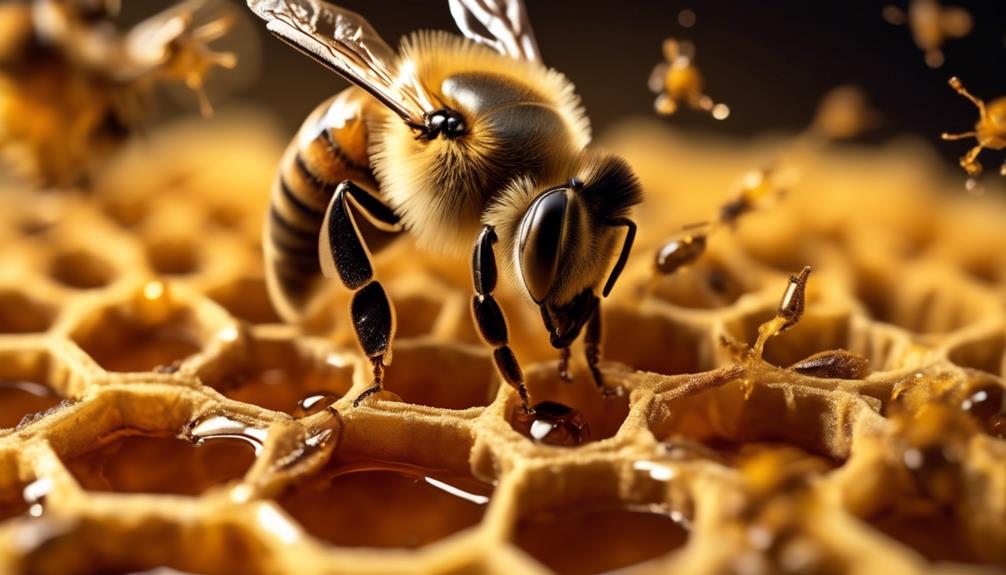
You might be wondering how bee venom is gathered without harming these vital pollinators – it's quite a fascinating process. It's primarily done through a method called 'electroshock venom collection'.
A glass pane is placed near the hive, emitting a mild electrical current. This doesn't harm the bees, but it does encourage them to sting the glass in defense. Since a bee's stinger can't penetrate the glass, the bee remains unharmed, but the venom is left behind, which is then collected and purified for use.
The process is meticulous and requires careful monitoring. The electrical stimulation is carefully regulated to ensure bees aren't harmed or excessively agitated. It's also crucial to collect the venom at the right time, as its composition can vary with the bee's diet and season.
The collected venom is then subjected to several purification steps. It's first freeze-dried to remove any water content, then it's further purified to eliminate other contaminants. This results in a fine white powder which is the bee venom used in skincare.
This process ensures the highest quality venom is obtained, while also prioritizing the well-being of the bees.
Bee Venom and Skincare Connection
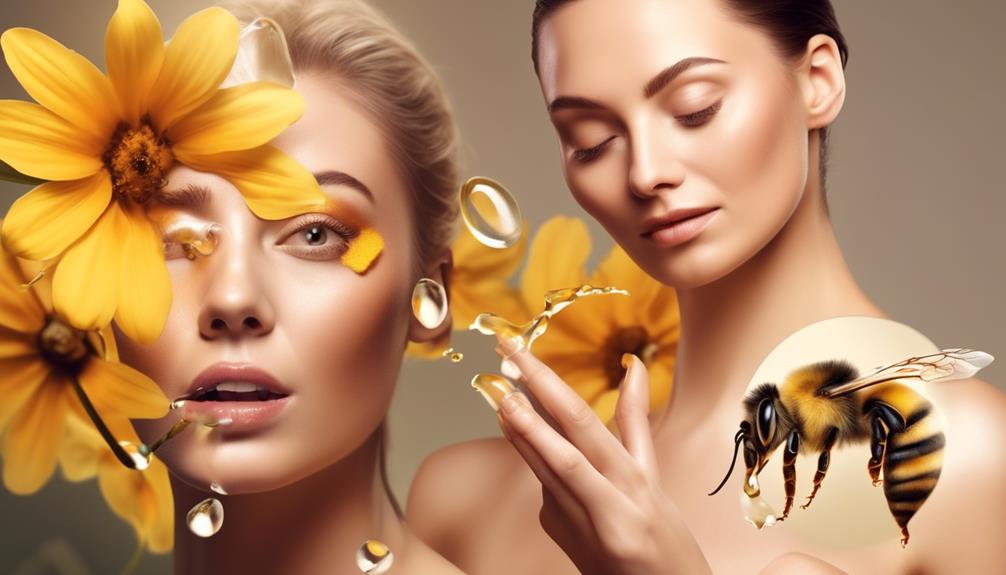
Now, let's delve into the intriguing connection between bee venom and skincare, exploring how this unique substance can enhance your skin's health and appearance.
Bee venom, or apitoxin, possesses potent anti-inflammatory and antibacterial properties that can effectively combat skin disorders like acne. It's also a natural alternative to harsh, synthetic chemicals frequently found in skincare products.
Bee venom works by tricking your skin into believing it's been stung, which stimulates blood flow and the production of collagen and elastin. These proteins are essential for maintaining your skin's elasticity and firmness, helping to combat signs of aging like wrinkles and sagging.
In addition, bee venom contains a compound called melittin, which has been found to inhibit bacterial growth and reduce inflammation. This makes it particularly beneficial for individuals with acne-prone skin. It's also rich in enzymes, peptides, and amino acids that nourish and hydrate the skin, promoting a healthy, glowing complexion.
However, it's important to note that while bee venom can be beneficial for many, it may cause allergic reactions in some individuals. Always perform a patch test before incorporating it into your regular skincare routine.
Proven Benefits of Bee Venom
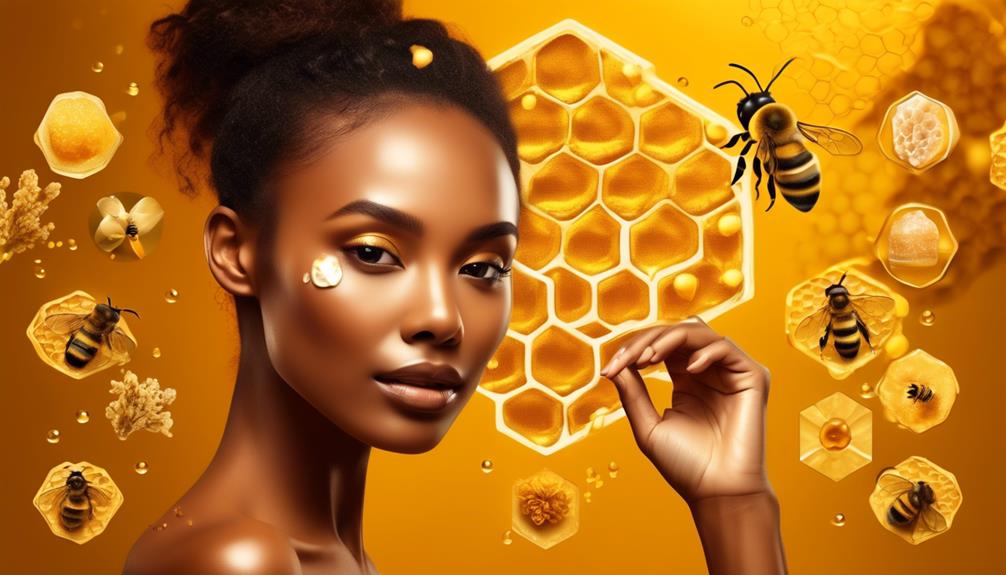
Countless studies have demonstrated the remarkable benefits of bee venom in skincare, showcasing its unique properties that enhance skin health and vitality. When applied topically, bee venom works to stimulate your skin's natural production of collagen and elastin, two key proteins that maintain your skin's firmness and elasticity. This increased production can help to reduce the appearance of fine lines and wrinkles, providing a smoother, more youthful complexion.
Moreover, bee venom possesses excellent anti-inflammatory properties. It's been shown to soothe irritated skin, decrease redness, and help manage conditions like acne and eczema. The melittin component of bee venom has been found to possess antibacterial properties, which can help in maintaining a healthy skin barrier and preventing breakouts.
Lastly, bee venom has been proven to significantly improve skin hydration. It does this by increasing the skin's ability to retain moisture, resulting in a plumper, dewy complexion.
Precautions Using Bee Venom Products
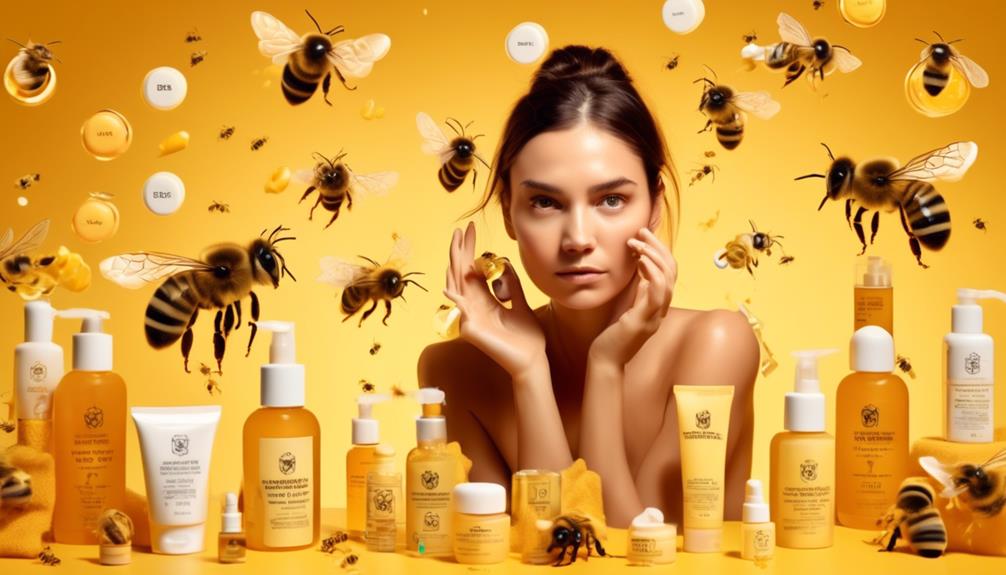
While the benefits of bee venom are numerous, it's crucial to exercise caution when incorporating these products into your skincare regimen due to potential allergic reactions. Much like a real bee sting, bee venom products can induce a localized allergic response, including redness, swelling, itching or even burning.
In more severe instances, you could experience anaphylaxis, a severe, life-threatening allergic reaction. If you have a known allergy to bee stings, it's advised that you avoid bee venom products entirely.
Before starting any new skincare product, particularly those containing potent ingredients like bee venom, it's wise to conduct a patch test. Apply a small amount of the product on a discrete area of your skin, like your wrist or behind your ear, and monitor for any adverse reactions for 24 hours.
Another consideration is the sourcing and concentration of the bee venom. Opt for products that contain ethically sourced bee venom and be cautious of products with high concentrations of venom, as they pose a higher risk of skin sensitivity or allergic reaction.
Frequently Asked Questions
What Are the Possible Allergic Reactions to Bee Venom in Skincare Products?
Bee venom in skincare can cause allergic reactions. You might experience redness, swelling, itching, or hives. In severe cases, you could have difficulty breathing, a rapid heart rate, or even anaphylaxis, a life-threatening allergic reaction.
It's crucial to patch test products and consult a dermatologist, especially if you're prone to allergies.
Are There Any Vegan Alternatives to Bee Venom in Skincare?
Yes, there are vegan alternatives to bee venom in skincare. You might want to consider plant-based options like aloe vera, chamomile, or green tea. These ingredients can soothe and rejuvenate your skin without the use of animal products.
Additionally, synthetic peptides are a lab-created alternative that can mimic the effects of bee venom.
Always remember, it's essential to patch test any new skincare product to avoid potential allergic reactions.
How Does Bee Venom Compare to Other Skincare Ingredients Like Retinol or Hyaluronic Acid?
Bee venom is unique in skincare. Unlike retinol, it doesn't promote cell turnover, but instead tricks your skin into thinking it's been stung, boosting collagen and blood flow.
Unlike hyaluronic acid, it doesn't hydrate, but it can help with inflammation. So, while it can't replace these ingredients, it adds a different approach to skincare.
Always patch test before using, as you don't want an allergic reaction.
Can Bee Venom in Skincare Products Harm Bees or Contribute to Bee Population Decline?
You may be concerned about the impact on bees from using skincare with bee venom. It's crucial to note that responsible manufacturers extract venom without killing the bees.
However, improper practices can harm bees, contributing to population decline. It's vital you choose brands committed to ethical sourcing, ensuring your skincare routine doesn't negatively impact these crucial pollinators.
Always research a brand's sourcing practices before purchasing.
Do Bee Venom Skincare Products Have a Specific Shelf Life?
Yes, like all skincare products, those containing bee venom have a specific shelf life. It's typically around 6-12 months after opening, but you'll need to check your product's packaging for exact details.
Conclusion
So, you've explored the buzz about bee venom in skincare. Extracted carefully, this potent substance has proven benefits for your skin, including anti-aging and anti-inflammatory effects.
But remember, it's vital to use bee venom products responsibly due to potential allergic reactions. With caution and knowledge, you can harness the power of nature's little workers to keep your skin looking its vibrant best.
Bee venom skincare? It's worth the buzz.

